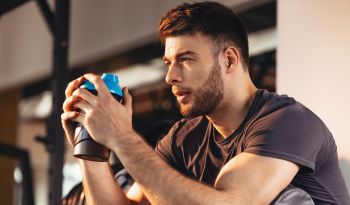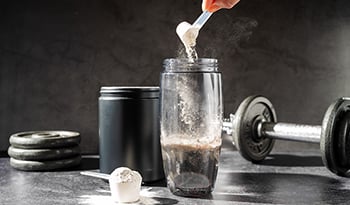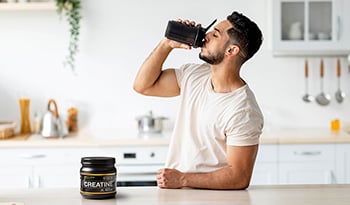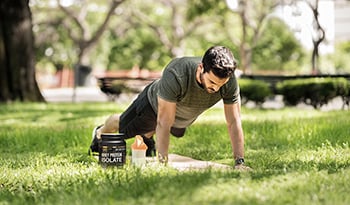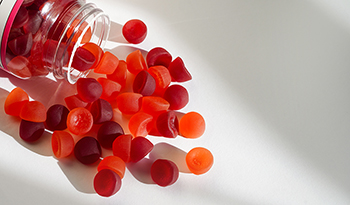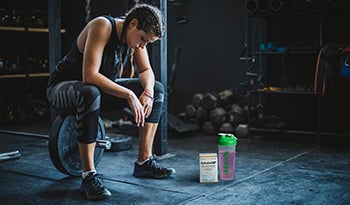Seberapa Penting Masa Makan Selepas Latihan?

Sejak beberapa tahun kebelakangan ini, masa makan dan pemakanan selepas latihan telah menjadi topik hangat bagi peminat kecergasan. Idea ada “tetingkap anabolik” selepas latihan adalah dan masih popular di kalangan pemula dan pengunjung gim lanjutan. Tetapi betapa pentingnya masa makan, sebenarnya?
Terdapat beberapa cara untuk mendekati persoalan masa makan selepas senaman. Dalam artikel ini, kami akan membincangkan sama ada masa makan benar-benar penting atau tidak, apabila masa makan adalah dan tidak penting, dan cara terbaik untuk menyusun makanan selepas latihan.
Adakah Masa Makan Penting?
Mengenai pentingnya waktu makan, tidak ada jawapan yang sesuai untuk semua. Sebagai contoh, bila makan selepas senaman mungkin lebih penting bagi seorang peminat kecergasan berbanding dengan yang lain, dan akan berdasarkan perbezaan kontekstual kehidupan seharian setiap individu.
Matlamat utama waktu makan berkisar pada idea memulihkan tenaga dan nutrien dalam jangka masa yang penting ketika tubuh dapat menggunakannya paling banyak, seperti selepas senaman yang berat. Semasa dan selepas senaman yang kuat, simpanan glikogen menjadi habis, tahap penghidratan cenderung menurun, dan otot berada dalam tempoh yang memerlukan pembaikan.
Oleh itu, makan selepas senaman dikatakan dapat membantu memulihkan apa yang telah hilang oleh tubuh, untuk meningkatkan tahap tenaga dan menyokong proses pemulihan dengan meningkatkan sintesis protein otot, iaitu bagaimana tubuh menggunakan protein untuk pulih dari senaman.
Masa makan tidak pernah menjadi isu hitam dan putih dan harus didekati dari pelbagai sudut pandangan. Faktor-faktor seperti pemakanan pra-senaman, jangka masa senaman, dan rejimen kecergasan semuanya boleh memainkan peranan dalam pentingnya waktu makan untuk pelbagai individu.
Apabila Masa Makan Penting
Untuk memastikan perkara agak mudah, berikut adalah dua kesempatan ketika waktu makan mungkin lebih penting bagi sesetengah individu.
Senario pertama merangkumi penduduk yang suka bersenam pada waktu pagi dengan perut kosong. Pada waktu pagi, tubuh biasanya memerlukan beberapa bentuk pemakanan dan makronutrien, kerana ia hanya berpuasa selama malam penuh.
Pada waktu pagi, tubuh belum menerima apa-apa bentuk makanan untuk mula memecah tenaga, jadi selepas senaman berpuasa, makronutrien menjadi sedikit lebih penting untuk memulihkan dan menambah tahap tenaga badan. Di luar potensi nutrien ini meningkatkan pemulihan, biasanya lebih penting untuk makan selepas senaman untuk tahap tenaga harian.
Masa lain ketika waktu makan cenderung penting ialah ketika atlet mengambil bahagian dalam pelbagai aktiviti berat dalam satu hari. Atlet yang melakukan dua hari mempunyai keperluan yang jauh lebih tinggi untuk mendapatkan nutrien untuk menambah tahap tenaga dan memudahkan pemulihan untuk permintaan tenaga mereka yang tinggi.
Apabila Masa Makan Tidak Betul Penting
Seperti yang disebutkan di atas, masa makan boleh dan mungkin penting untuk beberapa populasi dan senario, tetapi bagi sebahagian besar penduduk, masa makan tidak sangat relevan untuk kejayaan keseluruhan.
Makanan yang dimakan sepanjang hari memerlukan masa yang cukup untuk dicerna, yang meninggalkan tubuh dalam proses berterusan memecah makronutrienmenjadi bahan bakar dan alat untuk pemulihan. Oleh itu, jika seseorang telah makan makanan sebelum senaman, maka ada kemungkinan besar makanan yang sama masih akan dipecahkan selepas bersenam.
Dalam kes ini, masa makan dan pemakanan selepas senaman tidak begitu penting kerana tubuh sudah dalam proses menggunakan makanan untuk pemulihan dan bahan bakar. Selain itu, tubuh hanya dapat mencerna begitu banyak dalam satu tempoh, jadi idea bahawa lebih banyak tidak selalu menjadi kes terbaik dengan pemakanan selepas latihan.
Sebagai peraturan umum, “tetingkap anabolik” biasa dikatakan berlangsung dari 4-6 jam untuk populasi umum, jadi bergegas untuk makanan ringan selepas senaman sekali lagi, tidak selalu relevan untuk berjaya.
3 Langkah Penting untuk Menyusun Makanan Selepas Latihan
Setelah difahami bahawa masa makan selalunya bukan faktor pembuatan atau rehat untuk berjaya, maka pemakanan selepas senaman dapat dibina untuk gaya hidup seseorang.
Terdapat pelbagai cara untuk menyusun makanan selepas senaman, dan kebanyakan masa, komposisi makanan selepas senaman akan bergantung pada pilihan seseorang dan konteks latihan mereka. Salah satu cara untuk memikirkan makanan selepas senaman yang sempurna adalah dengan mempertimbangkannya formula pemulihan. Formula pemulihan ini adalah makanan bermasa yang direka untuk menyokong pemulihan, tenaga dan matlamat peribadi.
Ketika datang ke makanan sebelum dan selepas senaman, terdapat beberapa garis panduan umum yang boleh diingat seseorang untuk memastikan mereka memanfaatkan sepenuhnya pilihan pemakanan mereka. Sebagai permulaan, makanan ini harus disusun berdasarkan matlamat komposisi badan seseorang dan keperluan senaman.
1. Pengambilan Protein Adalah Penting
Ambil protein berkualiti. Kemungkinan besar, makanan pra-senaman masih dalam proses dicerna selepas senaman, jadi memakan protein berkualiti boleh berguna untuk tujuan pemulihan.
Contoh Makanan: Pilihan yang bagus untuk hidangan pra-senaman untuk pengangkat rekreasi dan atlet serius boleh menjadi oatmeal dengan serbuk protein . Hidangan ini akan menyampaikan karbohidrat yang dicerna perlahan dengan protein kaya dengan asid amino.
2. Pertimbangkan Berapa Kerap Anda Makan
Sebarkan makanan. Jika anda adalah sebahagian daripada populasi yang suka makan sebelum bersenam mereka, maka menyebarkan makanan secara merata sepanjang hari boleh berguna untuk menyediakan tubuh dengan tenaga pada setiap masa, terutamanya sebelum bersenam.
Contoh Makanan: Makanan lewat hari biasanya paling baik apabila mengandungi keseimbangan makronutrien berdasarkan rancangan senaman seseorang. Sebagai contoh, jika seseorang telah mengangkat pada siang hari dan mereka ingin mengambil kurang karbohidrat untuk waktu petang dan lebih banyak protein, maka makan sesuatu seperti puding kasein dengan mentega badam boleh menjadi pilihan yang baik.
3. Menggabungkan Karbohidrat
Rancang karbohidrat di sekitar latihan dan keperluan tenaga. Karbohidrat paling baik dianggap sebagai tenaga, jadi mempertimbangkan penggunaannya banyak di sekitar sebelum dan selepas senaman boleh berguna untuk memastikan seseorang mempunyai tenaga yang mencukupi untuk latihan, dan untuk memastikan mereka mengejar matlamat komposisi badan mereka dengan teliti.
Contoh Makanan: Katakan matlamatnya adalah kehilangan lemak badan dan seseorang hanya memakan karbohidrat di sekitar senaman mereka, kemudian memakan sesuatu seperti bijirin atau suplemen karbohidrat sebelum atau selepas senaman boleh menjadi cara yang berguna untuk memastikan tahap glikogen dipulihkan.
Pada penghujung hari, masa makan hanya sangat penting bagi sebahagian kecil penduduk. Walau bagaimanapun, ramai yang menikmati makanan sebelum dan selepas senaman mereka untuk menyokong matlamat komposisi badan dan keperluan tenaga mereka. Jika anda memilih untuk melakukan ini, maka cari makanan yang paling sesuai dengan tubuh anda, dan ingat bahawa tetingkap anabolik mungkin tidak begitu penting seperti yang paling cenderung untuk melihatnya.
Rujukan:
- Aragon, A., & Schoenfeld, B. (2013). Masa nutrien dikaji semula: adakah tetingkap anabolik selepas senaman? Jurnal Persatuan Pemakanan Sukan Antarabangsa, 10(1). doi:10.1186/1550-2783-10-5
- Keperluan pemakanan atlet daya tahan elit. Bahagian I: Keperluan karbohidrat dan cecair. (2019). Jurnal Sains Sukan Eropah. Diperolehi dari https://www.tandfonline.com/doi/abs/10.1080/17461390500076741
PENAFIAN:Hab Kesejahteraan ini tidak berhasrat untuk memberikan diagnosis...













































































 Kandungan
Kandungan




